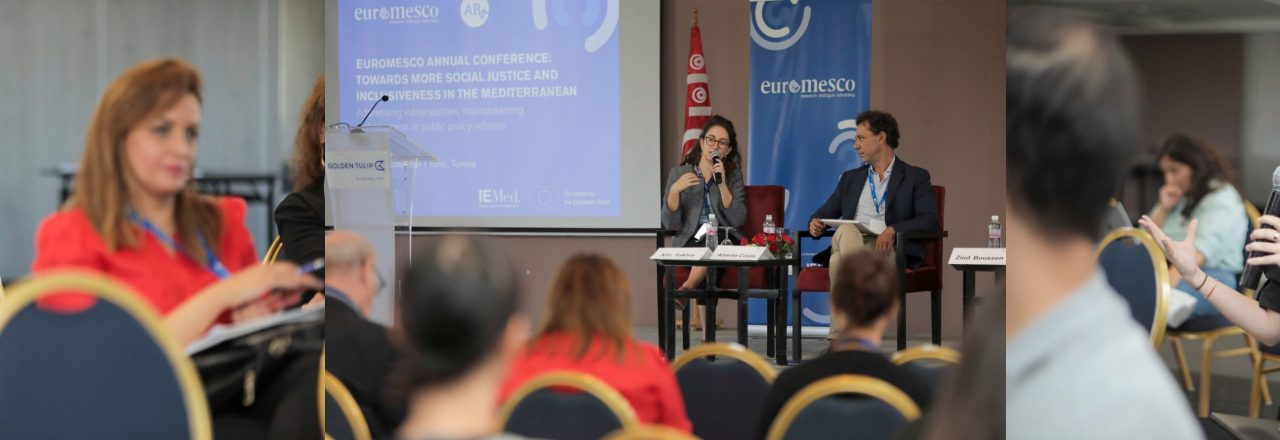
Addressing vulnerabilities, mainstreaming inclusiveness in public policy reforms – Tunisia Country Event
On 23 September, EuroMeSCo held the third country event of the Annual Conference in Tunis, Tunisia. Labelled as “Addressing vulnerabilities, mainstreaming inclusiveness in public policy reforms – Tunisia Country Event”, it provided a platform for researchers, civil society, international organisation and EU representatives for further discussion on the implementation of the New Agenda for the Mediterranean, focusing on the theme of Social Justice and Inclusiveness.
This event in Tunisia, co-organised with the Arab Reform Initiative (ARI), was attended by members of staff of the EU Delegation to Tunisia, representatives of the International Monetary Fund, of the Organisation for Economic Co-Operation and Development, researchers and experts. It tackled the topical issues of employment, inclusive policies and pathways to address vulnerabilities, with a look at Tunisia and the whole MENA region.
“We think the concept of social justice is an important one. Social justice remains a key concern and expectations of citizens around the region. Today, we will be looking in particular into how to address vulnerabilities and how to mainstream this concept of inclusiveness in the public policy reforms that are on the table in Tunisia.” Ambassador Senén Florensa, Executive President of IEMed.
The first plenary session aimed at addressing vulnerabilities and mainstreaming inclusiveness in public policy reforms. It looked into social justice for the most vulnerable groups. Women working in agriculture were brought forward as a highly vulnerable segment. The role of youth was at the centre of the debate, as youth face multi-dimensional difficulties: education, employment and civic participation remain major challenges for younger populations in Tunisia and in the region. In 2021, more than 40% of youth in Tunisia was unemployed. Migrants were addressed, with a focus on the need to increase public awareness and improve their conditions of migrants and refugees, an issue that is rather neglected by the public.
“There are new forms of vulnerabilities that challenge our classical understanding of vulnerable groups”. Farah Al Shami, Research Fellow at Arab Reform Initiative (ARI)
A second plenary session looked into the formalisation of labour and decent work. Experts pointed out that entering the informal sector is not always a deliberate choice, rather one driven by immediate needs and lack of trust in administration as providers of social protection systems. They analysed labour market challenges and warned that formalisation is not necessarily a condition for decent work under current circumstances. The role of public-private partnerships in the education sector were underpinned as crucial to address the needs of people not in employment, education or training (NEETs). The EU Delegation in Tunisia underlined its financial support to several social economy programmes.
The conference closed with a working session to present the two EuroMeSCo Papers: “Inclusive financing for small businesses and female entrepreneurship in Tunisia”, presented by Philippe Adair and Imène Berguiga, and “Employment vulnerability of youths and women in the Middle East amid Covid-19”, presented by Vladimir Hlasny.
The event report and the Papers will be published soon on our site. Stay tuned to the latest news by following us on Twitter!


